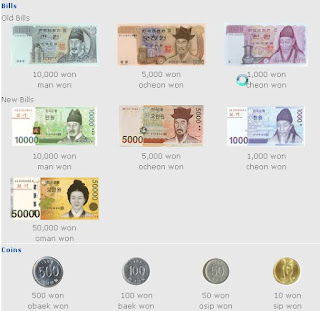1. Korea's Time is GMT+9, no daylights saving time.
2. During official holidays, offices, and banks are closed but palaces, museums, most restaurants, department stores, and amusement facilities are open. The most important traditional holidays for Koreans are Seollal and Chuseok. Seollal is Lunar New Year (like Chinese New Year) and Chuseok is Korean thanksgiving. People visit their hometown to celebrate with their families during Chuseok and Seollal.
Official Korean Holidays in 2010:
New Year's Day (January 1, 2010)
Seollal (February 13~15, 2010)
Independence Movement Day (March 1, 2010)
Children's Day (May 5, 2010)
Buddha's Birthday (May 21, 2010)
Memorial Day (June 6, 2010)
Liberation Day (August 15, 2010)
Chuseok (September 21~23, 2010)
National Foundation Day (October 3, 2010). My birthday also.. hehee.. in Korea I always don't go to the class in my birthday.
Christmas (December 25, 2010)
3. Business Hours in Korea
Banks are open from 9 am to 4 pm everyday except saturday, sunday, and national holidays.
Government offices and organizations are open from 9 am to 6 pm everyday except saturday, sunday, and national holidays.
Post Offices are open from 9 am to 6 pm on weekdays, 9 am to 1 pm on saturday, and are closed on sunday. Special for Gwanghwamun post offices: weekdays (9 am ~ 8 pm), saturday and sunday (9 am ~ 6 pm)
Foreign Diplomatic Missions are open on weekdays only. The opening hours are vary. More Info.
Department Stores are open everyday from 10.30 am to 8 pm.
4. Money & Currency
image from http://asiaenglish.visitkorea.or.kr/ena/AK/AK_EN_1_5_4.jsp
Average Price List of Goods
500 ml of water : 600 won
An apple : 1000 won
A bagel : 900 won
Ramyeon (Instant Noodle) : 600 - 900 won
Snack (small) : 700 won
Pizza Hut Supersupreme (Large) : 16,000 - 20,000 won
Starbucks Coffee Americano (Tall) : 3,300 won
Big Mac Set : 4,600 won
Bibimbap : 5,000 - 8,000 won
Movie ticket : 7,000 - 8,000 won
A book (small) : 8,000 - 12,000 won
CD : 15,000 won
DVD : 20,000 - 25,000 won
News paper : 500 - 700 won
PC bang (internet cafe) : 1,000 - 2,000 won per one hour
Karaoke room : 10,000 - 15,000 won per one hour
Soft Drink 250 ml : 700 won
Milk 1 L : 1,700 - 1,900 won
Cigarettes 1 box : 2,500 won
Bus fare : 1,000 won
Base taxi fare : 2,200 won
Subway fare : 1,000 (one service area)
1 USD = 1,150.95 KRW more info
1 KRW = 8.06257 IDR
5. Banking & ATM
Cards with the Plus and Cirrus logos are the easiest to use and most widely accepted in Korea. Some places accept international cards like China UnionPay, Maestro, Master card, Visa Electron, and JCB Cards. Banks as well as other sites have ATMs, where customers can make withdrawals, deposits, and fund transfers. However, as all ATM transactions require an account with a Korean bank, ATMs are not particularly convenient for international travelers except for getting cash advances on a credit card. If you have an account with Citibank, however, you can enjoy a more extensive range of banking services. Some ATM machines operate 24 hours a day, while others are open from 7 am to 12 am.
Cash dispenser machine (CD) can be found in subway stations, convenience stores, railway stations, bus terminal, and department stores. Most are open 24 hours and dispense cash in 10,000 won units. Most machines display English directions on the monitor, and also have Japanese and Chinese.
If you have any question about using ATM/CD machines, call the Korea Travel Phone at 1330.
6. Electricity and Voltage.
The standard voltage in Korea is 220 volt. The outlet has two round holes and is the same type used in Indonesia, France, Germany, Austria, Greece, Turkey, and many other countries.
7. Phone Calls/Mobile Phones/Internet
Internet services is offered in public places such as airports, train stations, and bus terminal in Korea. PC rooms and internet cafe are also great places to get internet service and easy to find everywhere.
Many Koreans carry cellular phones nowadays, eliminating the need for public telephone booths. Though many public telephone booths have now been removed, they still exist on streets where there are many pedestrians, near bus stops, inside subway stations, and in most public transportation facilities. Public telephones in Korea not only provide domestic call services, but also international call services as well.

2 comments:
mut,kaya itu deh mut..ummm apa namanya...yg suka ngasih tau informasi tentang suatu negara pas jalan jalan*ck lupa gw namanya (^_^i)
kya apa raaam?
:D
abis terinspirasi sama tmn2 gw yg mau ke korea gitu.. pada nanya byk bgt.. cape gw jawab satu2 mending gw bikin ginian aja. haha
Post a Comment